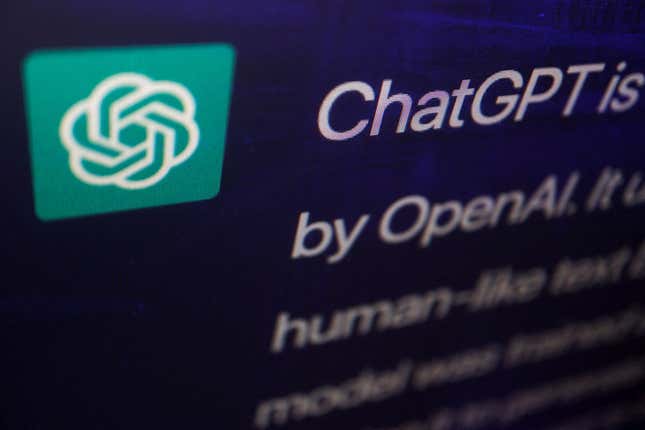Much ink—and worry—has been spilled about how AI could be coming for human jobs. But according to Indeed economist Cory Stahle, while we’re still in the early days of artificial intelligence, there may less to fear than we think.
Today (Oct. 26) the employment site published a report evaluating the jobs most exposed (or impacted by) to generative AI—and how artificial intelligence could change, rather than kill, careers. The report collected over 15 million job postings to evaluate the skills that employers commonly include—more than 2,000 in total—along with which could be performed or assisted by ChatGPT.
Advertisement
Among the findings: Women are marginally more exposed to generative AI than men. Of racial and ethnic groups, Asian American and Pacific Islanders have the highest exposure to generative AI, while Hispanics are least exposed.
Advertisement
That brings up an important distinction: Indeed’s study stresses that race and gender aren’t the main drivers of AI exposure; instead, it’s the occupations that certain demographics tend to be concentrated in that impact these groups. Women are slightly more likely to see AI change their jobs, for example, because they’re more likely to be employed in high-exposure industries like education and administration. And Asian American and Pacific Islanders tend to work in sectors with the highest exposure to generative AI—like mathematics and computer science—as Hispanics are represented in sectors with the least exposure.
Advertisement
There are differences, too, when it comes down to job title or location. Managers have a higher exposure to AI than non-managers, and remote jobs are more exposed than ones on an in-person or hybrid schedule. And in contrast to some narratives, the report posits that jobs that usually require physical skills are least affected by artificial intelligence.

Advertisement
Why generative AI may not be coming for your job
Stahle said the study’s purpose is to see every job where generative AI could possibly be used. Even in physical jobs—say, the warehouse runner or the classroom custodian—might need ChatGPT for email communications. But he’s skeptical that generative AI is coming for any job, even in roles that face automation like grocery store checkouts and driverless cars.
Advertisement
“There are still the human aspects in the jobs that are hard to replicate by Gen AI, or it’s hard to get people to accept and use,” said Stahle. “We’re so early in this Gen AI movement that it’s hard to know what the overall impact would be. That’s why we’re measuring by exposure rather than the nitty-gritty trends.”
It’s worth adding that only 0.05% of the millions of Indeed job postings this August asked for generative AI skills. 1.7% of the job postings asked for broader technological skills from fields like machine learning or data science. Those are pretty small numbers, Stahle said.
Advertisement
But while the shares remain small, Stale said, it’s worth picking up experience with AI applications like ChatGPT now—because every industry will eventually use them in some way.
“It’s not likely that people are going to lose their jobs. What is more likely is that people will be displaced by people who have these AI tool skillsets,” said Stahle. “Job seekers of all ages and groups should look to embrace these technologies—it can unlock the ability to move forward and unleash the potential workers can have.”
